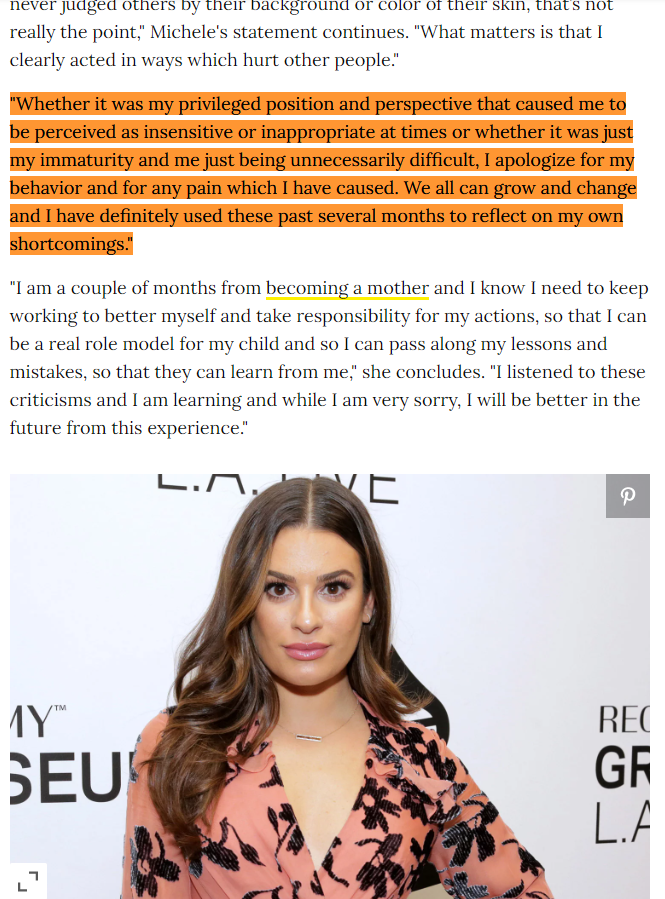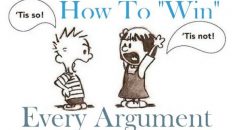00:01 Today we’re gonna be talking about apologies. How do how to give an apology how not to give an apology?
00:06 and how to receive an apology if somebody is saying they’re sorry to you I
00:11 don’t know if you’ve heard but lately there’s there’s been a big thing on Twitter about Lea Michele the actress from Glee’s a
00:19 Show a few years ago about a high school glee club really cute if you haven’t seen it
00:23 Anyway, apparently she was super mean to her colleagues and co-workers
00:29 She was a bully she was basically creating a toxic work environment and and it all sort of came out at once on Twitter and
00:36 She offered this
00:38 is to me what seemed like a very sincere heartfelt apology that completely backfired on her and totally turned around and and
00:45 kicked up another big storm
00:48 Anyway, we’ll talk about why that happened and I’ll show you what what she did wrong
00:52 But first let’s go into into how to do it ourselves. So we’re gonna be using the example of
00:58 Coming home late from work and and how that impacted your partner at home
01:05 so
01:06 first the the reason to apologize there’s only really one reason to apologize and that is because
01:13 You know that you’ve done something wrong you believe that you’ve done something wrong and that it’s caused some sort of
01:20 impact
01:22 Negative impact in the relationship and you want to repair the relationship?
01:26 The reason for an apology is to repair a relationship
01:30 It’s not to make you feel better
01:33 It’s not to vent anger as weird as that sounds that happen in sparing apologies, and it’s not to make what you did
01:40 Okay, or excuse it. The only reason you really want to be apologizing is because you think you’ve done something wrong and
01:49 Or if not wrong then at least against a commitment that you made and that’s caused some impact and you want to repair the relationship
01:59 those if you’re not apologizing for that reason, you probably don’t want to be apologizing you might instead want to
02:06 renegotiate the terms of your
02:08 relationship so if I’m coming home from work, and I’m really late and
02:13 I told my partner that I was gonna be home earlier, but I wasn’t then if I’ve done something wrong
02:20 then I can say hey like I I
02:23 Want to apologize for that if I don’t think I did anything wrong everything about me being late at work made sense
02:30 No problem
02:31 It wasn’t what I said
02:32 but there was every read there was it’s not a wrong action that I made then I don’t want to be apologizing for
02:38 Doing that. I want to be renegotiating
02:41 Something either the terms of our relationship or that agreement or something, but that’s not the time for an apology
02:48 People get into trouble because they think that what they did was, okay
02:52 And so they say things like and here’s some pitfalls that you run into. I’m sorry
02:58 But
02:59 Any time you say I’m sorry, but even if there’s a hole good apology inside there
03:04 I’m sorry for doing this and and Beauvoir, but what you’re really saying is
03:10 I’m sorry, but I’m not sorry. I’m sorry, but the thing that I did was actually okay
03:15 And so there’s an excuse built into that. So if you’re gonna say, I’m sorry, but
03:21 Not an apology
03:23 if you’re gonna say, I’m sorry that you
03:26 Not an apology
03:28 You might hear that a lot. Like I’m sorry that you’re feeling this way, but I’m not to blame here
03:34 Or I’m sorry that you didn’t understand what our relationship was, but it’s anytime you say
03:40 I’m sorry that you then that’s not an apology
03:44 Also, there’s a sort of slippery slope here of something. Like I’m sorry that I was. Unclear
03:50 That’s a different way. I’m sort of saying I’m sorry. You didn’t understand me. So
03:55 Those are the couple of pitfalls
03:56 I’m sorry, but and I’m sorry that you those are not apologies if that’s how you’re structuring your apology
04:03 That’s that’s you’re either not apologizing or you’re not quite doing it, right?
04:09 So, why would we how would we apologize if we’re doing this, right?
04:16 Number one you want to apologize for?
04:19 actions things that you’ve done things that you’ve said you don’t apologize for you don’t apologize for
04:27 circumstances
04:28 I’m sorry the traffic it’s I’m I I apologize for the things that I’ve done
04:35 Or I’ve said or haven’t done I’m committed to it haven’t said so
04:40 You apologize for your own actions?
04:43 And this is this is important because what that communicates is that you’re owning that you’ve done something
04:50 Right. I’m sorry. I
04:53 Came home late from work today, and I said that I wouldn’t be home late
04:57 I said I’d be home at this time, and I’m late
05:02 Mean what you’ve done or not done or said or not said there were two admit that there was probably some impact on the relationship
05:11 And
05:13 Either ask for what that impact was or guess at it, so, I’m sorry
05:19 I came home late, you know
05:22 What how is it for you that I came home late that I said?
05:25 This is what I was gonna do and I didn’t do it. What’s what’s the impact on you? You want to have that?
05:32 Potentially super awkward and difficult kind of conversation
05:35 Because that’s that’s the step. That’s one of the key steps in repairing relationship is is
05:43 Understanding how what you’ve done affects other people
05:47 Now if you’re if this is a public sort of forum, and you can’t have that dialog that one-on-one
05:53 Asking what the impact was then you can guess at what the impact was. I’m sorry. I’ve done this thing
05:58 I imagine that it affected everybody in this way. I
06:03 Really really think about that. I actually ask yourself
06:07 What what impact does this have on people around me and name it?
06:12 and number three is
06:15 Offer some sort of repair now that again that may be asking how how can I make this better?
06:21 What can may be offering things? I know I was late
06:25 I’m gonna do steps a B and C to make sure I’m not late next time
06:30 I know I was late. You might not be trusting anymore. Is there something that I can do here to?
06:38 to repair this and it’s not necessarily going to be
06:43 Fix it make it better. You can’t if you’re late, you can’t go back and
06:48 unlike yourself
06:49 If you’ve broken something maybe you can repair it. You can physically repair it or replace it
06:56 But remember the the purpose of this apology is is to repair a relationship
07:01 And so you not necessarily to undo the action that’s been done
07:07 it’s to generate more connection and
07:11 and
07:12 repair
07:13 ruptured connections in the relationship
07:17 So there’s a whole model that we could go over but but the gist of it is own what you’ve done and
07:25 Don’t make excuses for it
07:27 admit that there was probably some impact and explore what that impact was and then offer or ask for some way to
07:35 Begin repairing the connection between you two in the relationship
07:40 Now what happened with Lea Michele is that she she acknowledged? She was great. She knowledge of what she did and here’s what she wrote
07:48 Whether it was my privileged position in perspective
07:52 They caused me to be perceived as insensitive or inappropriate at times whether was just my immaturity
07:58 And being unnecessarily difficult. I apologize for my behavior and for any pain which I have caused now, that’s great
08:05 but where she went wrong was when she said
08:09 that caused me for to be perceived as
08:12 Insensitive or inappropriate. That’s that’s basically saying
08:16 I’m sorry that you looked at me that I’m sorry that you saw me this way
08:21 so she’s
08:24 I’m not saying that she said that but that’s often how it lands if somebody says to us
08:29 I’m sorry that you saw me this way incorrectly
08:34 then we were like
08:36 You can’t apologize for how I saw you you only apologize for your actions
08:41 So if somebody this is where she went wrong is is she seemed to do this nice heartfelt apology
08:48 But she met she missed that part and and she started apologizing with your how people perceived her which kind of sounds like an excuse
08:57 Now if somebody is apologizing to us
09:01 what we need to remember is that
09:03 apologies are a way of repairing a relationship an apology is
09:08 not saying that the thing they did was okay and
09:12 For us to an accept an apology is not saying I’m okay with what you did
09:19 you can be fully in your
09:22 You can be fully
09:24 Okay and saying I’m still angry at you I don’t like what you did
09:29 I’m not okay with what you did and I accept your apology. I
09:34 Accept your offer of amends. I accept your
09:37 Willingness to try to repair this thing that I still think was not okay that what was done
09:44 so if somebody’s coming to you with an apology you can have some grace and you can actually accept the apology and
09:50 Not be okay with the thing that was done and that’s I think where a lot of people get get
09:57 Torn and that they think accepting the apology is being okay with it, and that’s not true
10:04 So if you have any comments questions suggestions, I would love to hear what you thought about this video down below in the comments
10:13 If you if you like this video
10:15 Please click like if you’re watching it on YouTube
10:18 The more we can do that the more we can actually spread this kind of word around
10:21 So thank you very much, and I’ll see you next week
10:33 You
If you haven’t heard of Lea Michele’s big backfiring apology…. Good for you! You’ve managed to avoid that part of social media, and I applaud that. 🙂 But for a little background, she was the lead actress on a show called Glee. It’s fun, you should watch it. Anyway, she was accused of some pretty major bullying to her fellow cast members. She issued a heartfelt apology, and it TOTALLY BACKFIRED on her! Read more why later on.
First, let’s talk about apologies. How to apologize, how not to apologize, and how to receive an apology if someone offers you one.
WHY to Apologize
There is only really one reason to apologize. To repair a damaged relationship. That’s it.
You believe that something you did or said was wrong. Or if it’s not wrong, then at least it went against some commitment or agreement you made (remember, agreements can be explicit or implied). You did something and it had some negative impact on someone else, or multiple people. The thing you did or said caused some rift in the relationship, and you want to make amends and heal that rift, to repair the damage caused–however slight it was.
Also, they other person doesn’t need to know about the action. If you did something and kept it secret but the negative impact on the relationship is only felt from your side, that’s still a great reason to apologize.
Why NOT To Apologize
If you don’t think you did anything wrong or did not violate an agreement, then you shouldn’t apologize. If someone else is hurt in relation to something you did, that is not necessarily sufficient reason to apologize. If someone is hurt in relation to something you did when you had an agreement you wouldn’t do it, then that is a reason to apologize. If you didn’t break an agreement and the other person is still hurt, then you should look into renegotiating the relationship and your agreements rather than apologizing for your acceptable behavior.
If you feel bad and simply want to feel better, that is not a reason to apologize. And if you want to vent some anger, that is not a reason to apologize. (Strange as that sounds, venting anger often happens during apology attempts.) Remember, the reason to apologize is to heal a relational rift, not to ease your conscience (though that may happen as well).
How NOT To Apologize (Pitfalls)
There are a few common pitfalls people fall into when apologizing.
- Saying “I’m sorry but…” What follows the But is often reason why the thing you did was not your fault. This is not an apology. What the other person hears is, “I’m sorry I did this thing but I’m not really sorry because I couldn’t help but do this thing.” That doesn’t usually go over very well.
- Saying “I’m sorry that you…” I’m sorry that you didn’t like that, I’m sorry that you didn’t understand, etc. These are not apologies. This is another way of saying, “I’m sorry, but… this is actually your fault.” People generally don’t like to be blamed during an apology
- Saying “I’m sorry I was unclear.” This is another way of saying “I’m sorry you misunderstood me.” Not an apology.

What did Lea Michele do wrong? Take a look at her apology. She wrote,
“Whether it was my privileged position and perspective that caused me to be perceived as insensitive or inappropriate at times or whether it was just my immaturity and me being unnecessarily difficult, I apologize for my behavior and for any pain which I have caused. We can all grow and change and I have definitely used these past several months to reflect on my own shortcomings.
She fell for Pitfalls #2 and #3. In the midst of what appears to be a sincere and heart-felt apology, she essentially blamed other people for how they perceived her. I doubt this is what she intended to do, but that’s how it came across, as evidenced by the media storm her apology set off.
Why do we fall into these pitfalls? As always with this question, it’s because it is easier on our psyches and egos to go that route than the vulnerable route of admitting we were wrong with no one and nothing else to blame but ourselves. It’s easier to say, “I’m sorry you didn’t like that, but you should have known better,” than to say, “I’m sorry I didn’t do the thing I told you I would do. I take full responsibility. We do it because it’s easier on us, not because it’s effective. What would be effective? I’m glad you asked!
How To Apologize
Remember, the purpose of an apology is to repair a relationship. It is not to explain actions, excuse mistakes, or un-do anything that’s already been done. It is not to relieve you from guilt. It is only to repair a relationship. Given that, keep these steps in mind
- Take Responsibility. Don’t blame others, don’t blame circumstances, just own up to the fact that you what you agreed to and what you did didn’t line up. It doesn’t matter why or whether you could have done it different wrong because an apology is not about what you did. An apology is about repairing the relationship.
- Acknowledge Impact. Acknowledge that there was probably some impact on relationship. Ask the other person how they felt and were affected by what happened. Name how it affected you as well. If this is a public apology and you can’t have a 1-on-1 dialog, guess at what the impact was. Really take the other person’s perspective and ask how they were probably affected (especially emotionally) by what happened and say that.
- Offer Repair. Ask how to make it better, and offer repair. Remember, the goal is not to un-do what has been done. You can’t un-break a lamp or go back in time and not be late. That is not the point of repair. Sometimes a broken item can be repaired or replaced but that is not the point. Fixing a broken thing is a symbolic gesture that the relationship is important to you, and is the relationship you want to repair.
How To ACCEPT An Apology
I feel like a broken record, but this bears repeating: The purpose of an apology is not to un-do the thing that was done but to repair the relationship.
Most people don’t want to accept apologies because they think it means they will have to take the thing that was done as acceptable. This is not true.
An apology is an attempt at repair, not an admission of innocence. You DO NOT have to be OK with what the other person did in order for you to accept their apology.
Instead, accept the offer of repair for what is. “I am not OK with what you did, and I accept your apology because this relationship is important to me and I don’t want to let this hurt fester.”





Lovely distinctions, Tim! It’s very easy to diminish or side-step taking full responsibility by adding the ‘…sorry but…’ or the ‘…sorry that you…’ so thanks for the reminder. I particularly liked the refinement that apologies are reparations to mend relationship, not to make the ‘apologizer’ feel better – that really lands. I also appreciated the distinction you made that accepting an apology isn’t the same as accepting the behavior. The other was about acknowledging the damage or consequences your action/s caused your partner or whoever is impacted. NICE. Only ‘false notes’ for me occurred when the words ‘right’ and ‘wrong’ were utilized. Those words raise discomfort for me on multiple levels. I’d love to share impact in more detail if you’re curious. Love what you’re doing and fully support you!